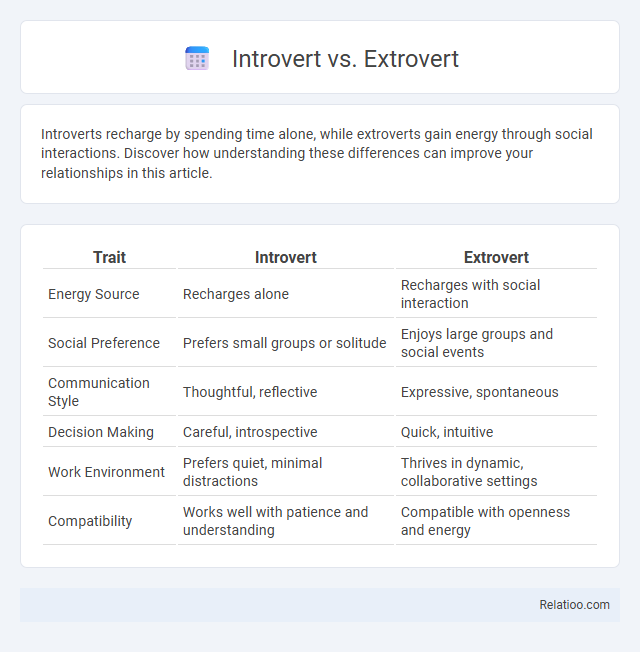Introverts recharge by spending time alone, while extroverts gain energy through social interactions. Discover how understanding these differences can improve your relationships in this article.
Table of Comparison
| Trait | Introvert | Extrovert |
|---|---|---|
| Energy Source | Recharges alone | Recharges with social interaction |
| Social Preference | Prefers small groups or solitude | Enjoys large groups and social events |
| Communication Style | Thoughtful, reflective | Expressive, spontaneous |
| Decision Making | Careful, introspective | Quick, intuitive |
| Work Environment | Prefers quiet, minimal distractions | Thrives in dynamic, collaborative settings |
| Compatibility | Works well with patience and understanding | Compatible with openness and energy |
Understanding Introverts and Extroverts
Understanding introverts and extroverts involves recognizing their distinct emotional needs and social energy management. Introverts recharge through solitude and require quiet environments to process emotions deeply, while extroverts gain energy from social interactions and often seek external stimulation for emotional fulfillment. Your awareness of these differences can improve communication and support in both personal and professional relationships.
Key Personality Traits Compared
Introverts often seek solitude to recharge, displaying deep focus and introspection, while extroverts thrive in social settings, showing high energy and sociability. Emotional needs differ as introverts require quiet understanding and meaningful connections, whereas extroverts benefit from external stimulation and active engagement. Understanding your personality traits helps tailor communication and relationships to better fulfill these distinct emotional desires.
Social Preferences and Interaction Styles
Introverts often prefer solitary or small group interactions to recharge, valuing deep, meaningful conversations that satisfy their emotional need for connection without overwhelming stimulation. Extroverts thrive in larger social settings, seeking energetic interactions that fulfill their need for social engagement and external validation. Understanding your social preferences and interaction style helps tailor environments that meet your emotional needs, promoting well-being and authentic communication.
Communication Differences
Introverts typically prefer thoughtful, one-on-one conversations and require quiet environments to recharge, while extroverts thrive on social interactions and express emotions openly in group settings. Emotional needs for introverts emphasize deep understanding and respect for personal boundaries, whereas extroverts seek active engagement and external validation through frequent communication. Recognizing these communication differences enhances interpersonal relationships by tailoring conversations to meet each personality's emotional and social preferences.
Energy Sources: Alone Time vs Socializing
Introverts recharge their energy through alone time, finding solitude essential for mental restoration and emotional balance, while extroverts gain vitality from social interactions, thriving in environments rich with conversation and group activities. Your emotional needs depend on recognizing whether solitude or social engagement best replenishes your mental and emotional resources. Understanding these energy sources helps tailor self-care strategies for improved well-being and interpersonal relationships.
Workplace Behaviors and Productivity
Understanding the differences between introverts, extroverts, and their emotional needs is crucial for optimizing workplace behaviors and productivity. Your introverted colleagues may excel in focused, independent tasks requiring deep concentration, while extroverts often thrive in collaborative settings that stimulate social interaction and idea sharing. Tailoring work environments and communication styles to meet these emotional needs enhances motivation, reduces stress, and boosts overall team effectiveness.
Relationships and Friendship Dynamics
Introverts often seek deep, meaningful conversations and value solitude to recharge, while extroverts thrive on social interaction and group activities, influencing the balance in relationships and friendships. Emotional needs differ as introverts require understanding and respect for their need for quiet reflection, whereas extroverts crave external validation and constant engagement. Recognizing these differences helps you navigate relationship dynamics by fostering empathy, enhancing communication, and meeting each person's unique emotional needs.
Challenges Faced by Each Personality
Introverts often face challenges in social settings where extroverts thrive, such as networking events or group discussions, leading to feelings of exhaustion or social anxiety. Extroverts may struggle with solitude and internal reflection, which can hinder emotional processing and personal growth. Emotional needs differ as introverts require quiet and alone time to recharge, whereas extroverts seek external stimulation and social interaction to feel fulfilled.
Myths and Misconceptions
Introverts are often misunderstood as shy or anti-social, while extroverts are inaccurately labeled as attention-seekers, creating myths that overlook the complexity of their emotional needs. Your emotional needs as an introvert or extrovert differ significantly, with introverts requiring solitude for recharge and extroverts thriving on social interaction. Misconceptions about emotional vulnerability also confuse introversion with emotional detachment, ignoring that both personality types experience deep emotional layers.
Finding Balance: Tips for Harmonious Coexistence
Introverts recharge through solitude while extroverts gain energy from social interactions, making understanding their emotional needs essential for balance. Prioritizing clear communication and respecting personal boundaries fosters harmonious coexistence between differing personality types. Incorporating shared activities that accommodate both quiet reflection and social engagement supports mutual emotional well-being.

Infographic: Introvert vs Extrovert
 relatioo.com
relatioo.com